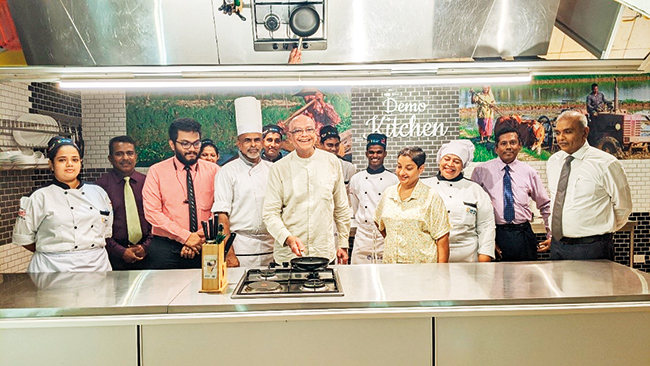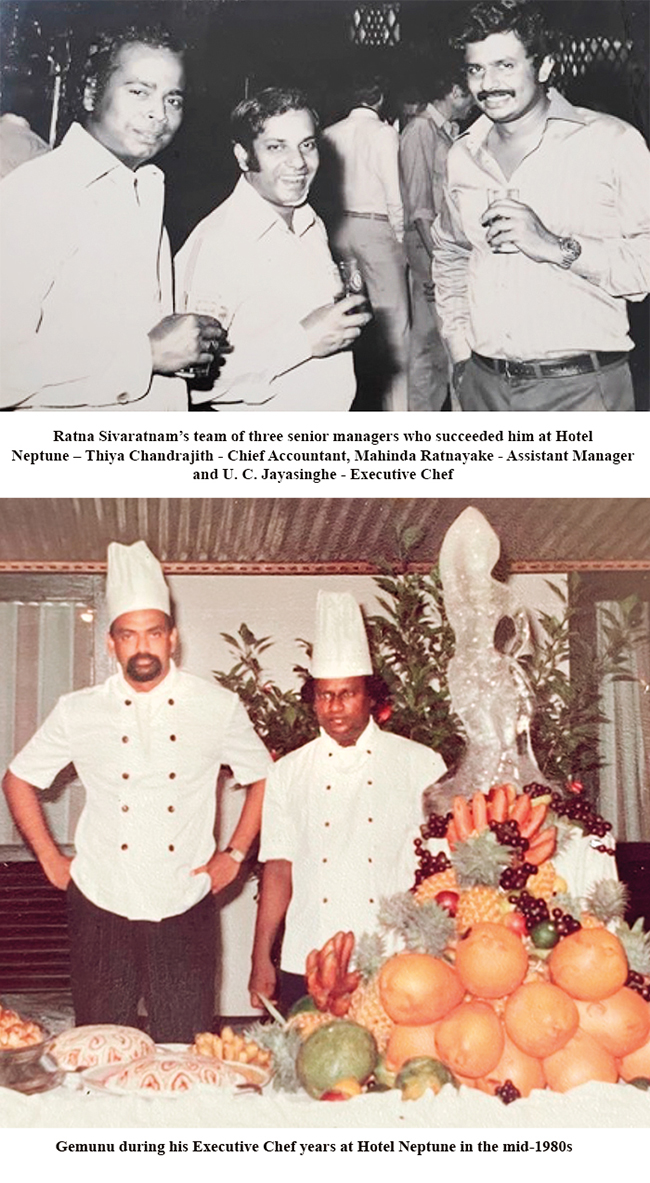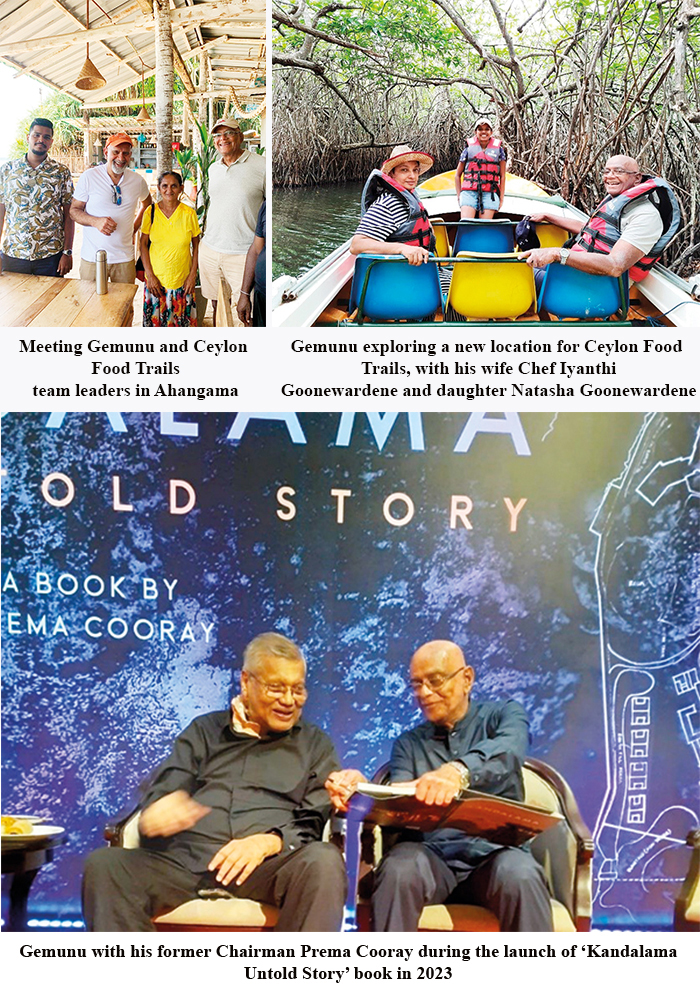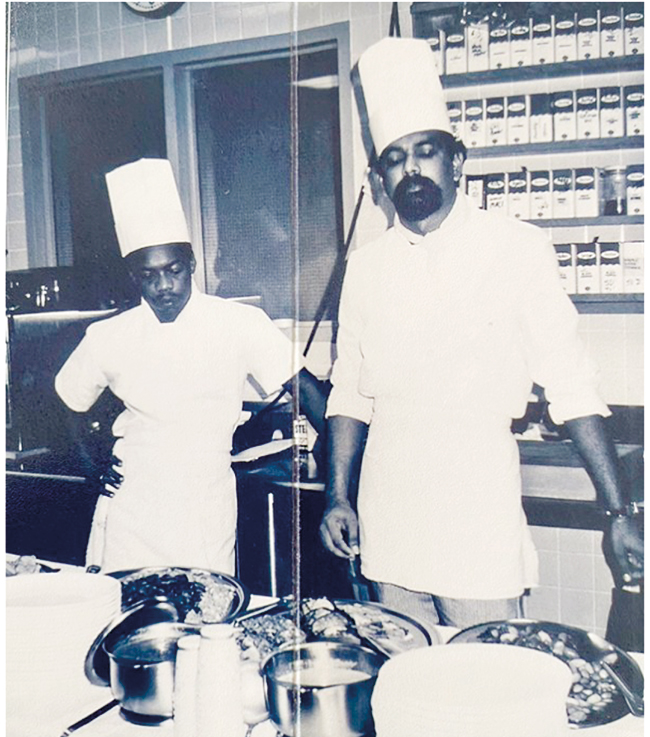Features
Gemunu Goonewardena Chef, Hotelier & Tourism Entrepreneur

PLACES, PEOPLE & PASSIONS (3Ps)
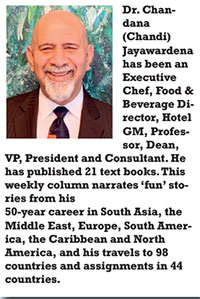 Dr. Chandana (Chandi) Jayawardena DPhil
Dr. Chandana (Chandi) Jayawardena DPhil
President – Chandi J. Associates Inc. Consulting, Canada
chandij@sympatico.ca
Profile
Gemunu commenced his hotel career in 1975 peeling onions, as a Kitchen Trainee at Hotel Neptune. He then continued with the same company for 43 years, slowly and steadily climbing steps, as Assistant Chef in 1978, Executive Chef in 1983, Corporate head of Food & Beverage in 1991, Director in 1998 and Vice President in 2010. In between, he gained experience as a Chef in Australia, and trained in USA. After his retirement from the company in 2018, he was appointed as a Non-Executive Director of Aitken Spence Hotel Holding PLC. Today, he is the Chairman of Win-Stone Group, Deputy Chairman of Marino Leisure Holdings, and until recently he served as the Chairman of the Tourist Hotels Classification Committee.
My first meeting with Gemunu
Just before Christmas in 1974, when Aitken Spence opened Hotel Neptune, it became the main “friendly” competitor for Bentota Beach Hotel, which was the best resort hotel in Sri Lanka at that time. Hotel Neptune recruited U. C. Jayasinghe (UC) the Assistant Chef of Bentota Beach, as their first Executive Chef. That change, for my luck, created an opening for me to join Bentota Beach hotel as the Trainee Executive Chef. One of my batchmates from Ceylon Hotel School (CHS), Patrick Taylor joined Neptune as the Assistant Chef. We were all good friends and frequently met after dinner service for a chat, a drink and fun.
One day in 1975, UC introduced Gemunu Goonewardena to me when I visited the Neptune kitchen. “Chandana, meet Gemunu, our new Kitchen Trainee. I am teaching him the ropes the hard way”, UC told me with a cheeky grin. Having worked under UC at Bentota Beach Hotel during my CHS internship in 1973, I knew that he was a tough boss. I felt sorry for Gemunu when UC pushed him aggressively, to learn the trade. Gemunu is one year younger to me, and I identified him as a late developer, just like me. We became friends.
Although Gemunu was occasionally upset with UC, he was determined to master culinary arts. Forty-eight years later I am convinced, that tough training he received in the mid 1970s, built Gemunu’s character and laid a strong foundation for one of the greatest careers in the hotel industry of Sri Lanka, that commence peeling onions and ended with creating innovative visions at boardrooms for decades. I am immensely proud of Gemunu and very happy to call him my friend.
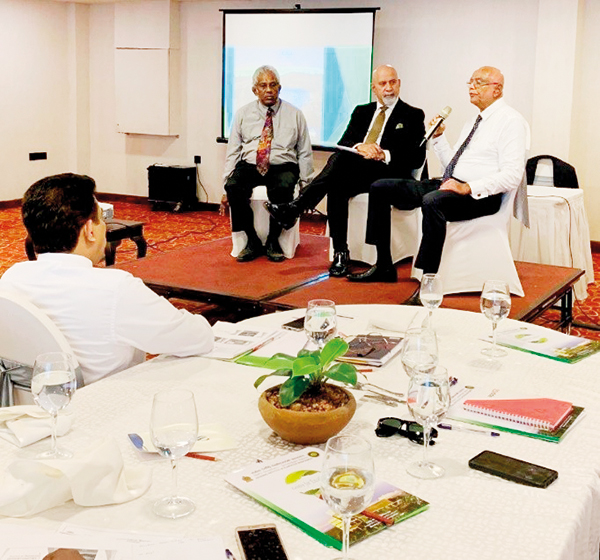
Gemunu joined me as a panellist at a National Institute of Plantation Management (NIPM seminar I conducted for 25 senior plantation managers in 2023
Friend, Student and Partner
In 1981, when I left a senior management position at John Keells corporate office to join CHS as a Senior Lecturer, Gemunu had spent five years studying there while working at Hotel Neptune. Soon after that Gemunu graduated from CHS. In 1991, when I ran a series of management seminars as the Managing Director of the International Hotel School of Mount Lavinia Hotel. Gemunu was a regular at seminars. I then realized that he is a lifelong learner, and hungry for all types of knowledge. Our close friendship continued until I left Sri Lanka in 1994 to pursue my global career.
After that from a distance, I occasionally heard the progress Gemunu was making in Sri Lanka. Gemunu is renowned for his innovative approach to gastronomy. He spearheaded the ‘Heritance Cuisine’ that combines local ingredients, traditional techniques, and international influences. His latest endeavor, ‘Ceylon Food Trails’, offers an immersive experience into Sri Lankan culture and authentic indigenous food in remote villages.
In 2021, when I commenced my autobiographical Sunday Island newspaper column: ‘Confessions of a Global Gypsy’, Gemunu commenced calling me in Canada every Sunday after he read the latest episode of the series. Our Sunday discussions became longer every week, with the series motivating Gemunu to ask me various questions. Gemunu loved engaging in meaningful conversations. “Gemunu, please don’t call me before 11:00 am, because I watch my favourite weekly TV program – The Global Public Square (GPS) with Fareed Zakaria, at that time.” I gently pushed Gemunu’s weekly calls on Sundays to after 9:30 pm Sri Lanka time.
When Gemunu invited me to do some assignments for the International Tourism Volunteers Association (ITVA), I asked him, “What is ITVA?” he explained, “that it is a loosely formed association – more like a consortium of hospitality and tourism professionals to connect and pursue common activities or causes in a more relaxed environment.” Gemunu is a good salesman, and I was convinced to give my time free, to speak, lead and moderate a few webinars. Global Hospitality Forum, which I lead, collaborated with ITVA, in those initiatives.
Gemunu Taking Charge of my Schedule
When I casually informed Gemunu that I will spend seven weeks in Sri Lanka from mid-March 2023, Gemunu formally took charge of my itinerary. My intention of spending a relaxed holiday with the family had to be changed. Gemunu filled my schedule with various re-connection meetings with veteran hoteliers, excursions around the island with Gemunu, and a few innovative leadership seminars for various hotel management teams.
A highlight of my seven-week visit to Sri Lanka in 2023, was gaining first-hand ‘Ceylon Food Trails’ experiences in Ahangama and Ingiriya. It was refreshing getting to know of Gemunu’s passion on sustainable development of community tourism to showcase authentic cuisine of Sri Lanka.
Gemunu’s team simply facilitate and promote the concept, but it is the leaders from the village communities who run each operation and village service providers who benefit from each operation. Gemunu is keen that 70% of the income from Ceylon Food Trails operations remain within the villages. “We currently have 12 operations in different parts of the country. Our aim is to eventually help 100 villages”, Gemunu shared his optimism with me. “Let’s do a colourful book with all these authentic village recipes, when you reach 52 – one per week”, I planted a seed in his mind.
As exploring human behaviour is a new hobby of Gemunu, I was invited to do a seminar on my concept of ‘Personality Analysis’ to his top leadership team of Win-Stone Group. Gemunu and his wife – Iyanthi who manages the Win-Stone Culinary School, honoured me by attending the whole seminar. After the seminar, I asked Gemunu 10 questions for this article.
Q: Out of all the places you have visited in Sri Lanka and overseas, what is your favorite and most interesting place?
A: I deeply appreciate and admire the rich tapestry of historical and contemporary architectural wonders found across various nations. Among them, one gem that truly captivates my heart is the ancient city of Anuradhapura, dating back to the 5th century BC. Anuradhapura’s unparalleled cultural and historical significance, coupled with its breathtaking aesthetic allure, makes it truly deserving of the utmost admiration and acclaim.
Q: Out of all the inspiring people you have met, who inspired you most?
A: Out of all the remarkable individuals I have had the privilege of meeting, Mr. Ratna Sivaratnam stands out as the most inspiring. I used to work under him from the start of my career. As a consummate professional and a true gentleman, he played an instrumental role in shaping Aitken Spence Hotels and Travels into the successful entity it is today and ended up as the Chairman of the company. Witnessing his leadership qualities firsthand, I found him to be an exceptional leader whom everyone enjoyed working with and working under.
Q: In addition to Mr. Ratna Sivaratnam, I am aware that you had a few outstanding mentors. Please explain how they helped you at different stages of your career?
A:Mr. Mahinda Ratnayake was my first mentor. He hired me fresh out of Nalanda College and instilled in me a sense of discipline and working in an organized manner. Under the guidance of Mr. U. C. Jayasinghe, the first Executive Chef of Hotel Neptune, I learned invaluable lessons that contributed to my growth as a successful chef. Upon my transfer to Palm Village from Neptune, Mr. Thiya Chandrajith, the Aitken Spence Group General Manager, became my mentor, empowering me to enhance my performance. Then Mr. Prema Cooray, with whom I closely collaborated during the Kandalama Hotel Project and Aitken Spence Hotels in the Maldives. He supported me in my innovative and unconventional approaches when facing challenges.
Lastly, Managing Director Mr. Malin Hapugoda when the company opened and managed Waters Edge, and then took over hotel projects in India and Oman. I learnt from him high level conceptual skills. He tolerated some of my idiosyncrasies and balanced it out which helped the company immensely to become the largest Sri Lankan hotel company operating in four countries.
Q: At the present time, what is your key passion in life, other than gastronomy, hospitality, and tourism?
A: Currently, it revolves around exploring human behavior. I find great fascination in studying the intricacies of human interactions and motivations. As a student of geopolitics, I constantly seek to deepen my understanding of global affairs and their impact on societies as well. Furthermore, I derive immense pleasure from engaging in meaningful conversations and appreciating the company of diverse individuals. I firmly believe that each person carries a unique story and I thoroughly enjoy conversing with people who possess such rich experiences. It is through these interactions that I continually learn and gain valuable insights from others, broadening my perspective and enriching my personal growth.
Q: From your time studying and training in Sri Lanka, Australia and USA, which experience stands out as the most memorable?
A: The most memorable experience occurred at Neptune Hotel in Sri Lanka. It involved an incident where a staff member of our hotel had an altercation with the senior village headman, resulting in the entire village surrounding us in search of the attacker. However, the elders of the village intervened and pleaded for our safety, highlighting the values of unity, community, and solidarity. The tactical and diplomatic way Mr. Mahinda Ratnayake handled this incident taught us the importance of working together with the local community, fostering mutual benefit rather than division. Through effective communication, we resolved the situation without further escalation. From a professional culinary standpoint, I gained memorable experience as a mature student at the Culinary Institute of America, New York.
Q: During your early career, what was the most rewarding experience you had as a Chef?
A: One of the most gratifying experiences was when I was the Executive Chef and Food & Beverage Manager of Hotel Palm Village in 1983. I was entrusted with the task of organizing a grand gala dinner for a staggering 500 guests, which occurred every fortnight over a period of six months. At that time, the hotel was equipped to accommodate and cater to only 100 guests, making this challenge quite formidable. However, under the guidance and support of Mr. Chandrajith, I eagerly embraced the opportunity. The entire experience was a mix of vivid memories—rewarding, chaotic, and incredibly educational.
Q: How do you describe your key corporate contributions during the long period you served as a Director and a Member of the Board at Aitken Spence Hotel Holding PLC., and in building the ‘Heritance’ brand?
A: During my tenure at Aitken Spence Hotel Holdings PLC., I made significant corporate contributions by spearheading the development of several iconic properties. My primary focus was to seamlessly blend the architectural designs of these properties with their practical operational aspects, ensuring a harmonious balance between aesthetics and functionality. Additionally, I had the privilege of mentoring numerous associates who went on leading a successful career and reached the top of their field.
Regarding the ‘Heritance’ brand, I played a pivotal role in establishing the Minimum Quality Standards (MQS) Manual. I approached the branding of Heritance in a distinctive and novel manner, differentiating it from other prominent brands in Sri Lanka and the region. The name “Heritance” itself, derived from the fusion of “Heritage” and “Inheritance,” was chosen to embody the unique historical and cultural essence of each property and its surrounding environment. This approach gave the Heritance brand a distinct identity and outlook, capturing the essence of its individuality and deep-rooted connections to heritage.
Q: How do you describe your main contribution at a macro level, to the hotel industry in Sri Lanka when you served as the Chairman of the Tourist Hotels Classification Committee?
A: During my term as the Chairman, I led the introduction of qualitative aspects such as hotel branding to ensure certified quality and enhance the property and destination image. My main contribution at a macro level to the hotel industry in Sri Lanka was focused on promoting sustainable tourism. Our team introduced localized standards that encompassed all four aspects of conservation, community, culture, and commerce, with the aim of positively impacting the well-being of the planet and its people. One of the key criteria we implemented was encouraging hotel properties to actively address biodiversity conservation through sustainable solutions. This involved carefully selecting products in the food and beverage sector and working closely with communities and producers who embraced biodiversity conservation in their production cycles. Through these initiatives, our objective was to foster a sustainable and responsible approach to tourism, where the natural environment, wildlife, local communities, and cultural heritage were respected, conserved, and celebrated.
Q: Currently, you seem to have many irons in the fire, with Win-Stone Group, Tamarind Tree Hotel, Marino Beach Hotel, Ceylon Food Trails etc. What is your secret in managing time and developing the next generation of industry leaders?
A: First, I aim to create a conducive environment for people to perform, an environment that fosters optimal performance among individuals. To achieve this, I provide clear principles, values, and policies, and then empower them to take ownership of the project/work given to them. At the same time, if any mistakes or problem occur, I step forth and take the blame. My management approach revolves around inspiring my colleagues and associates to willingly engage in tasks by aligning their desires with the objectives I set forth. By creating a sense of intrinsic motivation, I encourage them to enthusiastically embrace their duties where they perform their best. Hence, my secret lies in a leadership approach centred on delegation and giving responsibility.
Q: In a context of “Sustainable Development”, what are the key lessons you learnt by leading the concept of ‘Heritance Cuisine’, that helped you to develop ‘Ceylon Food Trails’?
A: Leading the concept of ‘Heritance Cuisine’ taught me the significance of sustainable development in the culinary realm. By showcasing the fusion of local ingredients and international influences, I realized the value of highlighting the unique flavors and ingredients found within Sri Lanka. This experience inspired me to delve deeper into indigenous recipes and the traditional knowledge surrounding local food, including its health benefits. Consequently, this led to the development of ‘Ceylon Food Trails,’ where I aim to study and share the rich culinary heritage of Sri Lanka with the world, emphasizing sustainable practices and the cultural significance of gastronomy.
recipes and the traditional knowledge surrounding local food, including its health benefits. Consequently, this led to the development of ‘Ceylon Food Trails,’ where I aim to study and share the rich culinary heritage of Sri Lanka with the world, emphasizing sustainable practices and the cultural significance of gastronomy.
Next week, 3Ps will feature a historian and author who is also an adventurer and an award-winning filmmaker …
Features
The US-China rivalry and challenges facing the South
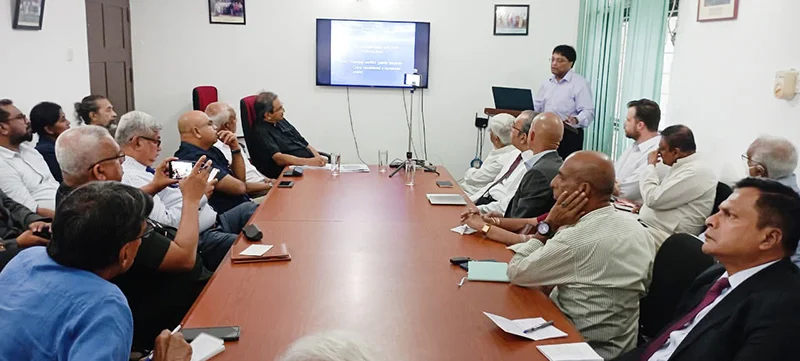
 The US-China rivalry could be said to make-up the ‘stuff and substance’ of world politics today but rarely does the international politics watcher and student of the global South in particular get the opportunity of having a balanced and comprehensive evaluation of this crucial relationship. But such a balanced assessment is vitally instrumental in making sense of current world power relations.
The US-China rivalry could be said to make-up the ‘stuff and substance’ of world politics today but rarely does the international politics watcher and student of the global South in particular get the opportunity of having a balanced and comprehensive evaluation of this crucial relationship. But such a balanced assessment is vitally instrumental in making sense of current world power relations.
Thanks to the Regional Centre for Strategic Studies (RCSS), Colombo the above window of opportunity was opened on December 8th for those sections of the public zealously pursuing an understanding of current issues in global politics. The knowledge came via a forum that was conducted at the RCSS titled, ‘The US-China Rivalry and Implications for the Indo-Pacific’, where Professor Neil DeVotta of the Wake Forest University of North Carolina in the US, featured as the speaker.
A widely representative audience was present at the forum, including senior public servants, the diplomatic corps, academics, heads of civil society organizations, senior armed forces personnel and the media. The event was ably managed by the Executive Director of the RCSS, retired ambassador Ravinatha Aryasinha. Following the main presentation a lively Q&A session followed, where many a point of interest was aired and discussed.
While there is no doubt that China is fast catching up with the US with regard to particularly military, economic, scientific and technological capability, Prof. DeVotta helped to balance this standard projection of ‘China’s steady rise’ by pointing to some vital facts about China, the omission of which would amount to the observer having a somewhat uninformed perception of global political realities.
The following are some of the facts about contemporary China that were highlighted by Prof. DeVotta:
* Money is steadily moving out of China and the latter’ s economy is slowing down. In fact the country is in a ‘ Middle Income Trap’. That is, it has reached middle income status but has failed to move to upper income status since then.
* People in marked numbers are moving out of China. It is perhaps little known that some Chinese are seeking to enter the US with a view to living there. The fact is that China’s population too is on the decline.
* Although the private sector is operative in China, there has been an increase in Parastatals; that is, commercial organizations run by the state are also very much in the fore. In fact private enterprises have begun to have ruling Communist Party cells in them.
* China is at its ‘peak power’ but this fact may compel it to act ‘aggressively’ in the international sphere. For instance, it may be compelled to invade Taiwan.
* A Hard Authoritarianism could be said to characterize central power in China today, whereas the expectation in some quarters is that it would shift to a Soft Authoritarian system, as is the case in Singapore.
* China’s influence in the West is greater than it has ever been.
The speaker was equally revelatory about the US today. Just a few of these observations are:
* The US is in a ‘Unipolar Moment’. That is, it is the world’s prime power. Such positions are usually not longstanding but in the case of the US this position has been enjoyed by it for quite a while.
* China is seen by the US as a ‘Revisionist Power’ as opposed to being a ‘Status Quo Power.’ That is China is for changing the world system slowly.
* The US in its latest national security strategy is paying little attention to Soft Power as opposed to Hard Power.
* In terms of this strategy the US would not allow any single country to dominate the Asia-Pacific region.
* The overall tone of this strategy is that the US should step back and allow regional powers to play a greater role in international politics.
* The strategy also holds that the US must improve economic ties with India, but there is very little mention of China in the plan.
Given these observations on the current international situation, a matter of the foremost importance for the economically weakest countries of the South is to figure out how best they could survive materially within it. Today there is no cohesive and vibrant collective organization that could work towards the best interests of the developing world and Dr. DeVotta was more or less correct when he said that the Non-alignment Movement (NAM) has declined.
However, this columnist is of the view that rather being a spent force, NAM was allowed to die out by the South. NAM as an idea could never become extinct as long as economic and material inequalities between North and South exist. Needless to say, this situation is remaining unchanged since the eighties when NAM allowed itself to be a non-entity so to speak in world affairs.
The majority of Southern countries did not do themselves any good by uncritically embracing the ‘market economy’ as a panacea for their ills. As has been proved, this growth paradigm only aggravated the South’s development ills, except for a few states within its fold.
Considering that the US would be preferring regional powers to play a more prominent role in the international economy and given the US’ preference to be a close ally of India, the weakest of the South need to look into the possibility of tying up closely with India and giving the latter a substantive role in advocating the South’s best interests in the councils of the world.
To enable this to happen the South needs to ‘get organized’ once again. The main differences between the past and the present with regard to Southern affairs is that in the past the South had outstanding leaders, such as Jawaharlal Nehru of India, who could doughtily stand up for it. As far as this columnist could ascertain, it is the lack of exceptional leaders that in the main led to the decline of NAM and other South-centred organizations.
Accordingly, an urgent task for the South is to enable the coming into being of exceptional leaders who could work untiringly towards the realization of its just needs, such as economic equity. Meanwhile, Southern countries would do well to, indeed, follow the principles of NAM and relate cordially with all the major powers so as to realizing their best interests.
Features
Sri Lanka and Global Climate Emergency: Lessons of Cyclone Ditwah
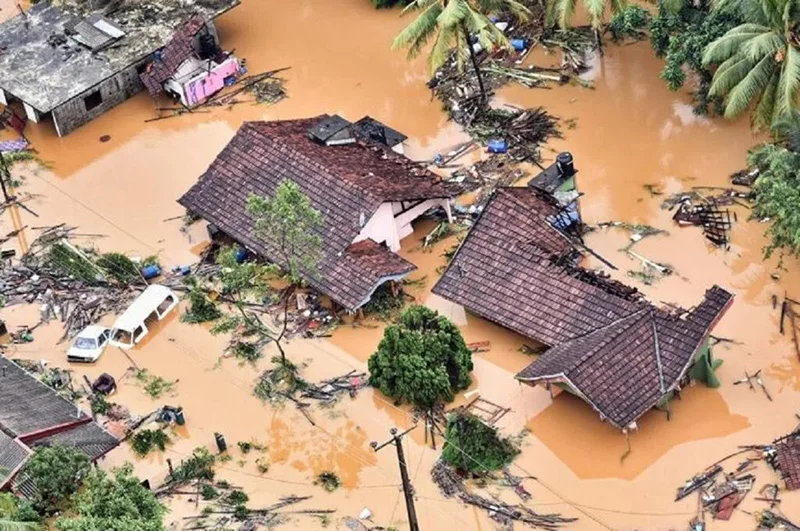
Tropical Cyclone Ditwah, which made landfall in Sri Lanka on 28 November 2025, is considered the country’s worst natural disaster since the deadly 2004 tsunami. It intensified the northeast monsoon, bringing torrential rainfall, massive flooding, and 215 severe landslides across seven districts. The cyclone left a trail of destruction, killing nearly 500 people, displacing over a million, destroying homes, roads, and railway lines, and disabling critical infrastructure including 4,000 transmission towers. Total economic losses are estimated at USD 6–7 billion—exceeding the country’s foreign reserves.
The Sri Lankan Armed Forces have led the relief efforts, aided by international partners including India and Pakistan. A Sri Lanka Air Force helicopter crashed in Wennappuwa, killing the pilot and injuring four others, while five Sri Lanka Navy personnel died in Chundikkulam in the north while widening waterways to mitigate flooding. The bravery and sacrifice of the Sri Lankan Armed Forces during this disaster—as in past disasters—continue to be held in high esteem by grateful Sri Lankans.
The Sri Lankan government, however, is facing intense criticism for its handling of Cyclone Ditwah, including failure to heed early warnings available since November 12, a slow and poorly coordinated response, and inadequate communication with the public. Systemic issues—underinvestment in disaster management, failure to activate protocols, bureaucratic neglect, and a lack of coordination among state institutions—are also blamed for avoidable deaths and destruction.
The causes of climate disasters such as Cyclone Ditwah go far beyond disaster preparedness. Faulty policymaking, mismanagement, and decades of unregulated economic development have eroded the island’s natural defenses. As climate scientist Dr. Thasun Amarasinghe notes:
“Sri Lankan wetlands—the nation’s most effective natural flood-control mechanism—have been bulldosed, filled, encroached upon, and sold. Many of these developments were approved despite warnings from environmental scientists, hydrologists, and even state institutions.”
Sri Lanka’s current vulnerabilities also stem from historical deforestation and plantation agriculture associated with colonial-era export development. Forest cover declined from 82% in 1881 to 70% in 1900, and to 54–50% by 1948, when British rule ended. It fell further to 44% in 1954 and to 16.5% by 2019.
Deforestation contributes an estimated 10–12% of global greenhouse gas emissions. Beyond removing a vital carbon sink, it damages water resources, increases runoff and erosion, and heightens flood and landslide risk. Soil-depleting monocrop agriculture further undermines traditional multi-crop systems that regenerate soil fertility, organic matter, and biodiversity.
In Sri Lanka’s Central Highlands, which were battered by Cyclone Ditwah, deforestation and unregulated construction had destabilised mountain slopes. Although high-risk zones prone to floods and landslides had long been identified, residents were not relocated, and construction and urbanisation continued unchecked.
Sri Lanka was the first country in Asia to adopt neoliberal economic policies. With the “Open Economy” reforms of 1977, a capitalist ideology equating human well-being with quantitative growth and material consumption became widespread. Development efforts were rushed, poorly supervised, and frequently approved without proper environmental assessment.
Privatisation and corporate deregulation weakened state oversight. The recent economic crisis and shrinking budgets further eroded environmental and social protections, including the maintenance of drainage networks, reservoirs, and early-warning systems. These forces have converged to make Sri Lanka a victim of a dual climate threat: gradual environmental collapse and sudden-onset disasters.
Sri Lanka: A Climate Victim
Sri Lanka’s carbon emissions remain relatively small but are rising. The impact of climate change on the island, however, is immense. Annual mean air temperature has increased significantly in recent decades (by 0.016 °C annually between 1961 and 1990). Sea-level rise has caused severe coastal erosion—0.30–0.35 meters per year—affecting nearly 55% of the shoreline. The 2004 tsunami demonstrated the extreme vulnerability of low-lying coastal plains to rising seas.
The Cyclone Ditwah catastrophe was neither wholly new nor surprising. In 2015, the Geneva-based Internal Displacement Monitoring Centre (IDMC) identified Sri Lanka as the South Asian country with the highest relative risk of disaster-related displacement: “For every million inhabitants, 15,000 are at risk of being displaced every year.”
IDMC also noted that in 2017 the country experienced seven disaster events—mainly floods and landslides—resulting in 135,000 new displacements and that Sri Lanka “is also at risk for slow-onset impacts such as soil degradation, saltwater intrusion, water scarcity, and crop failure”.
Sri Lanka ranked sixth among countries most affected by extreme weather events in 2018 (Germanwatch) and second in 2019 (Global Climate Risk Index). Given these warnings, Cyclone Ditwah should not have been a surprise. Scientists have repeatedly cautioned that warmer oceans fuel stronger cyclones and warmer air holds more moisture, leading to extreme rainfall. As the Ceylon Today editorial of December 1, 2025 also observed:
“…our monsoons are no longer predictable. Cyclones form faster, hit harder, and linger longer. Rainfall becomes erratic, intense, and destructive. This is not a coincidence; it is a pattern.”
Without urgent action, even more extreme weather events will threaten Sri Lanka’s habitability and physical survival.
A Global Crisis
Extreme weather events—droughts, wildfires, cyclones, and floods—are becoming the global norm. Up to 1.2 billion people could become “climate refugees” by 2050. Global warming is disrupting weather patterns, destabilising ecosystems, and posing severe risks to life on Earth. Indonesia and Thailand were struck by the rare and devastating Tropical Cyclone Senyar in late November 2025, occurring simultaneously with Cyclone Ditwah’s landfall in Sri Lanka.
More than 75% of global greenhouse gas emissions—and nearly 90% of carbon emissions—come from burning coal, oil, and gas, which supply about 80% of the world’s energy. Countries in the Global South, like Sri Lanka, which contribute least to greenhouse gas emissions, are among the most vulnerable to climate devastation. Yet wealthy nations and multilateral institutions, including the World Bank, continue to subsidise fossil fuel exploration and production. Global climate policymaking—including COP 30 in Belém, Brazil, in 2025—has been criticised as ineffectual and dominated by fossil fuel interests.
If the climate is not stabilised, long-term planetary forces beyond human control may be unleashed. Technology and markets are not inherently the problem; rather, the issue lies in the intentions guiding them. The techno-market worldview, which promotes the belief that well-being increases through limitless growth and consumption, has contributed to severe economic inequality and more frequent extreme weather events. The climate crisis, in turn, reflects a profound mismatch between the exponential expansion of a profit-driven global economy and the far slower evolution of human consciousness needed to uphold morality, compassion, generosity and wisdom.
Sri Lanka’s 2025–26 budget, adopted on November 14, 2025—just as Cyclone Ditwah loomed—promised subsidised land and electricity for companies establishing AI data centers in the country.
President Anura Kumara Dissanayake told Parliament: “Don’t come questioning us on why we are giving land this cheap; we have to make these sacrifices.”
Yet Sri Lanka is a highly water-stressed nation, and a growing body of international research shows that AI data centers consume massive amounts of water and electricity, contributing significantly to greenhouse gas emissions.
The failure of the narrow, competitive techno-market approach underscores the need for an ecological and collective framework capable of addressing the deeper roots of this existential crisis—both for Sri Lanka and the world.
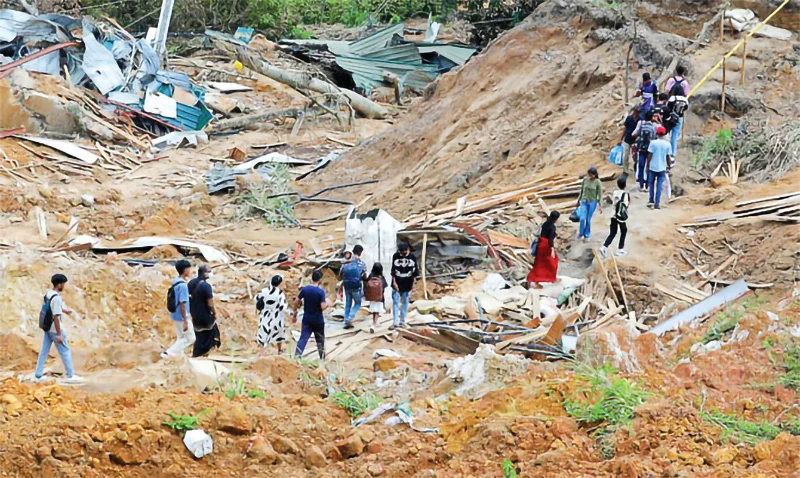
A landslide in Sri Lanka (AFP picture)
Ecological and Human Protection
Ecological consciousness demands
recognition that humanity is part of the Earth, not separate from it. Policies to address climate change must be grounded in this understanding, rather than in worldviews that prize infinite growth and technological dominance. Nature has primacy over human-created systems: the natural world does not depend on humanity, while humanity cannot survive without soil, water, air, sunlight, and the Earth’s essential life-support systems.
Although a climate victim today, Sri Lanka is also home to an ancient ecological civilization dating back to the arrival of the Buddhist monk Mahinda Thera in the 3rd century BCE. Upon meeting King Devanampiyatissa, who was out hunting in Mihintale, Mahinda Thera delivered one of the earliest recorded teachings on ecological interdependence and the duty of rulers to protect nature:
“O great King, the birds of the air and the beasts of the forest have as much right to live and move about in any part of this land as thou. The land belongs to the people and all living beings; thou art only its guardian.”
A stone inscription at Mihintale records that the king forbade the killing of animals and the destruction of trees. The Mihintale Wildlife Sanctuary is believed to be the world’s first.
Sri Lanka’s ancient dry-zone irrigation system—maintained over more than a millennium—stands as a marvel of sustainable development. Its network of interconnected reservoirs, canals, and sluices captured monsoon waters, irrigated fields, controlled floods, and even served as a defensive barrier. Floods occurred, but historical records show no disasters comparable in scale, severity, or frequency to those of today. Ancient rulers, including the legendary reservoir-builder King Parākramabāhu, and generations of rice farmers managed their environment with remarkable discipline and ecological wisdom.
The primacy of nature became especially evident when widespread power outages and the collapse of communication networks during Cyclone Ditwah forced people to rely on one another for survival. The disaster ignited spontaneous acts of compassion and solidarity across all communities—men and women, rich and poor, Buddhists, Christians, Muslims, and Hindus. Local and international efforts mobilized to rescue, shelter, feed, and emotionally support those affected. These actions demonstrated a profound human instinct for care and cooperation, often filling vacuums left by formal emergency systems.
Yet spontaneous solidarity alone is insufficient. Sri Lanka urgently needs policies on sustainable development, environmental protection, and climate resilience. These include strict, science-based regulation of construction; protection of forests and wetlands; proper maintenance of reservoirs; and climate-resilient infrastructure. Schools should teach environmental literacy that builds unity and solidarity, rather than controversial and divisive curriculum changes like the planned removal of history and introduction of contested modules on gender and sexuality.
If the IMF and international creditors—especially BlackRock, Sri Lanka’s largest sovereign bondholder, valued at USD 13 trillion—are genuinely concerned about the country’s suffering, could they not cancel at least some of Sri Lanka’s sovereign debt and support its rebuilding efforts? Addressing the climate emergency and the broader existential crisis facing Sri Lanka and the world ultimately requires an evolution in human consciousness guided by morality, compassion, generosity and wisdom. (Courtesy: IPS NEWS)
Dr Asoka Bandarage is the author of Colonialism in Sri Lanka: The Political Economy of the Kandyan Highlands, 1833-1886 (Mouton) Women, Population and Global Crisis: A Politico-Economic Analysis (Zed Books), The Separatist Conflict in Sri Lanka: Terrorism, Ethnicity, Political Economy, ( Routledge), Sustainability and Well-Being: The Middle Path to Environment, Society and the Economy (Palgrave MacMillan) Crisis in Sri Lanka and the World: Colonial and Neoliberal Origins, Ecological and Collective Alternatives (De Gruyter) and numerous other publications. She serves on the Advisory Boards of the Interfaith Moral Action on Climate and Critical Asian Studies.
Features
Cliff and Hank recreate golden era of ‘The Young Ones’

 Cliff Richard and Hank Marvin’s reunion concert at the Riverside Theatre in Perth, Australia, on 01 November, 2025, was a night to remember.
Cliff Richard and Hank Marvin’s reunion concert at the Riverside Theatre in Perth, Australia, on 01 November, 2025, was a night to remember.
The duo, who first performed together in the 1950s as part of The Shadows, brought the house down with their classic hits and effortless chemistry.
The concert, part of Cliff’s ‘Can’t Stop Me Now’ tour, featured iconic songs like ‘Summer Holiday’, ‘The Young Ones’, ‘Bachelor Boy’, ‘Living Doll’ and a powerful rendition of ‘Mistletoe and Wine.’
Cliff, 85, and Hank, with his signature red Fender Stratocaster, proved that their music and friendship are timeless.
According to reports, the moment the lights dimmed and the first chords of ‘Move It’ rang out, the crowd knew they were in for something extraordinary.
Backed by a full band, and surrounded by dazzling visuals, Cliff strode onto the stage in immaculate form – energetic and confident – and when Hank Marvin joined him mid-set, guitar in hand, the audience erupted in applause that shook the hall.
Together they launched into ‘The Young Ones’, their timeless 1961 hit which brought the crowd to its feet, with many in attendance moved to tears.
The audience was treated to a journey through time, with vintage film clips and state-of-the-art visuals adding to the nostalgic atmosphere.
Highlights of the evening included Cliff’s powerful vocals, Hank’s distinctive guitar riffs, and their playful banter on stage.
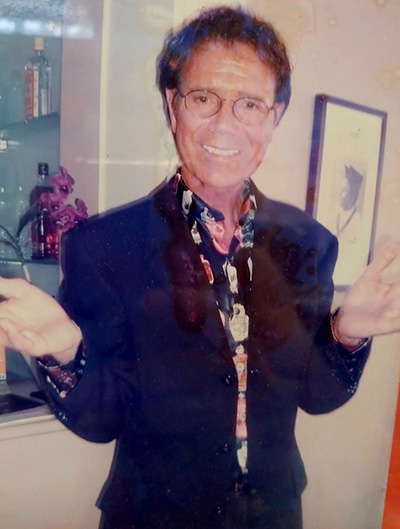
Cliff posing for The Island photographer … February,
2007
Cliff paused between songs to reflect on their shared journey saying:
“It’s been a lifetime of songs, memories, and friendship. Hank and I started this adventure when we were just boys — and look at us now, still up here making noise!”
As the final chords of ‘Congratulations’ filled the theatre, the crowd rose for a thunderous standing ovation that lasted several minutes.
Cliff waved, Hank gave a humble bow, and, together, they left the stage, arm-in-arm, to the refrain of “We’re the young ones — and we always will be.”
Reviews of the show were glowing, with fans and critics alike praising the duo’s energy, camaraderie, and enduring talent.
Overall, the Cliff Richard and Hank Marvin reunion concert was a truly special experience, celebrating the music and friendship that has captivated audiences for decades.
When Cliff Richard visited Sri Lanka, in February, 2007, I was invited to meet him, in his suite, at a hotel, in Colombo, and I presented him with my music page, which carried his story, and he was impressed.
In return, he personally autographed a souvenir for me … that was Cliff Richard, a truly wonderful human being.
-

 News3 days ago
News3 days agoOver 35,000 drug offenders nabbed in 36 days
-

 Business5 days ago
Business5 days agoLOLC Finance Factoring powers business growth
-

 Features1 day ago
Features1 day agoFinally, Mahinda Yapa sets the record straight
-

 News2 days ago
News2 days agoCyclone Ditwah leaves Sri Lanka’s biodiversity in ruins: Top scientist warns of unseen ecological disaster
-

 News5 days ago
News5 days agoCPC delegation meets JVP for talks on disaster response
-

 News5 days ago
News5 days agoA 6th Year Accolade: The Eternal Opulence of My Fair Lady
-

 News3 days ago
News3 days agoRising water level in Malwathu Oya triggers alert in Thanthirimale
-
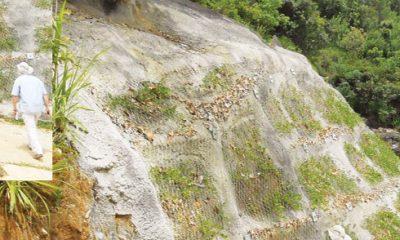
 Features4 days ago
Features4 days agoThe Catastrophic Impact of Tropical Cyclone Ditwah on Sri Lanka:

